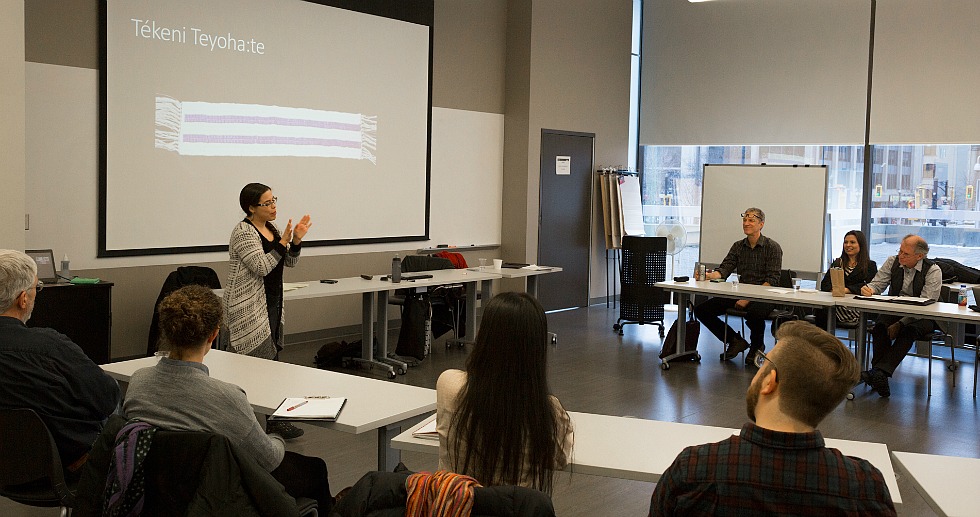McMaster’s centre for narrative arts helping to tell and preserve Hamilton’s stories

Kaitlin Debicki (Kanien’keha:ka, Wolf Clan, from Six Nations of the Grand River) gives her talk, “Yotsitsyonte O:se & ‘Going Back on their Tracks’: How Eastern Flowering Dogwood Taught Me to Be My Own Creation Story.” It was one of three community-based narratives shared at a recent event hosted by the McMaster’s Centre for Community Engaged Narrative Arts.
“When human beings gather in numbers in a location, in a natural environment, what they will do is obliterate that natural environment…but the landscape persists. It seems to be gone, but it’s not. It’s changed, but you can still call upon it. It still has a memory.”
This was how Hamilton poet and author John Terpstra introduced his story on Hamilton’s Chedoke Creek, buried decades ago to make way for the Chedoke expressway but which continues to flow underground down the west side of the Hamilton Mountain into Cootes Paradise – evidence that while altered, the natural landscape endures.
It was one of three community-based narratives shared at Stories of the ‘More-than-human-world,’ a recent event focussed on stories of the land and what the natural world can teach us.
The event is the latest in a series of public forums hosted by McMaster’s Centre for Community Engaged Narrative Arts (CCENA) that have, for the past year, been bringing together community groups, artists, individual community members, academics, and arts organizations to share stories from the Hamilton community.
“You can contribute a lot to the strength and vitality of a community just by saying, “What are its stories? Which ones do you know and how do we value those stories?” says Daniel Coleman, co-director of CCENA and a professor in the Department of English and Cultural Studies.
Coleman and CCENA co-director Lorraine York, also a professor in the Department of English and Cultural Studies, say it’s all part of an ongoing effort by the Centre to work with community partners to identify and gather stories from the Hamilton Community and preserve these stories though physical or electronic archiving.
They, along with CCENA research assistant Melissa Tanti, say events like Stories of the ‘More-than-human-world,’ provide the ideal opportunity to share and capture a range of community narratives.
“Today we had members of the art community here, we had teachers, we had geographers, horticulturalists, that’s a lot of knowledge in one room being exchanged,” says Tanti, who helped organize the event. “We want to create a space for that to happen, to invite people from the community and stimulate conversations.”
York says these kinds conversations have already inspired collaborations between CCENA and individuals or organizations from the Hamilton community.
“We’re finding that the projects that are coming to the fore are coming out of communities; they aren’t coming from us,” says York. “They’re coming from community groups that are already thinking about collecting their histories.”
York says, they are currently collaborating on several projects including oral histories of the protests that took place in response the building of the Red Hill Valley Parkway, as well as stories told by residents of Brightside, a once thriving neighbourhood bordering the Stelco Steel Mill, but which has now been reduced to only a few houses.
“We’ve been so amazed by the quality and vitality of the stories, and the creativity that people have for generating and collecting them, says Coleman. “The Centre is a way of not losing those stories and preserving them so people can keep track of them over time.”
Learn more about upcoming events hosted by CCENA.
Speakers at Stories of the ‘More-than-human-world also included:
Kaitlin Debicki (Kanien’keha:ka, Wolf Clan, from Six Nations of the Grand River) with her talk, “Yotsitsyonte O:se & ‘Going Back on their Tracks’: How Eastern Flowering Dogwood Taught Me to Be My Own Creation Story.”
Randy Kay, (OPIRG McMaster) with his story, “Cold Stream of Consciousness: A story of McMaster’s Parking Lot ‘M.’


